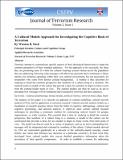Files in this item
A cultural models approach for investigating the cognitive basis of terrorism
Item metadata
| dc.contributor.author | Sieck, Winston R. | |
| dc.date.accessioned | 2013-09-02T15:16:54Z | |
| dc.date.available | 2013-09-02T15:16:54Z | |
| dc.date.issued | 2011-02-02 | |
| dc.identifier.citation | Sieck, W.R. (2011). A cultural models approach for investigating the cognitive basis of terrorism. Journal of Terrorism Research, 2(1), pp. 3-15. | en_US |
| dc.identifier.issn | 2049-7040 | en_US |
| dc.identifier.uri | http://ojs.st-andrews.ac.uk/index.php/jtr/article/view/171 | en_US |
| dc.identifier.uri | https://hdl.handle.net/10023/4033 | |
| dc.description.abstract | Terrorists attempt to communicate specific aspects of their ideological frameworks to shape the common perspective of their intended audiences. For the approach to be successful, the ideas they are promoting must fit within the cultural meaning systems shared across the population they are addressing. Knowing what messages will effectively persuade their constituents is likely intuitive for terrorists operating within their own cultural environment, but not necessarily for researchers who come from distinct cultural backgrounds. A method is thus described for studying in detail the common perspective that members of a culture bring to a situation. The method results in models of the culture that provide a basis for outsiders to begin to frame events from the cultural-insider point of view. The cultural models can then be used as an aid to anticipate how messages will be interpreted and evaluated by terrorists and their audiences. | en_US |
| dc.language.iso | en | en_US |
| dc.publisher | Centre for the Study of Terrorism and Political Violence, University of St Andrews | en_US |
| dc.relation.ispartof | Journal of Terrorism Research | en_US |
| dc.rights | This is an open access article published in Journal of Terrorism Research. This work is licensed under a Creative Commons Attribution 3.0 License (http://creativecommons.org/licenses/by/3.0/) | en_US |
| dc.rights.uri | http://creativecommons.org/licenses/by/3.0/ | |
| dc.subject | Jihad | en_US |
| dc.subject | Islam | en_US |
| dc.subject | Cultural epidemiology | en_US |
| dc.subject | Mental models | en_US |
| dc.subject | Political violence | en_US |
| dc.subject | Terrorist mind | en_US |
| dc.subject.lcc | HV6431 | en_US |
| dc.subject.lcsh | Terrorism | en_US |
| dc.title | A cultural models approach for investigating the cognitive basis of terrorism | en_US |
| dc.type | Journal article | en_US |
| dc.accrualMethod | ||
| dc.description.version | https://doi.org/Publisher PDF | en_US |
| dc.publicationstatus | Published | en_US |
| dc.status | Peer reviewed | en_US |
| dc.identifier.doi | https://doi.org/http://doi.org/10.15664/jtr.171 | en |
This item appears in the following Collection(s)
Except where otherwise noted within the work, this item's licence for re-use is described as This is an open access article published in Journal of Terrorism Research. This work is licensed under a Creative Commons Attribution 3.0 License (http://creativecommons.org/licenses/by/3.0/)
Items in the St Andrews Research Repository are protected by copyright, with all rights reserved, unless otherwise indicated.


